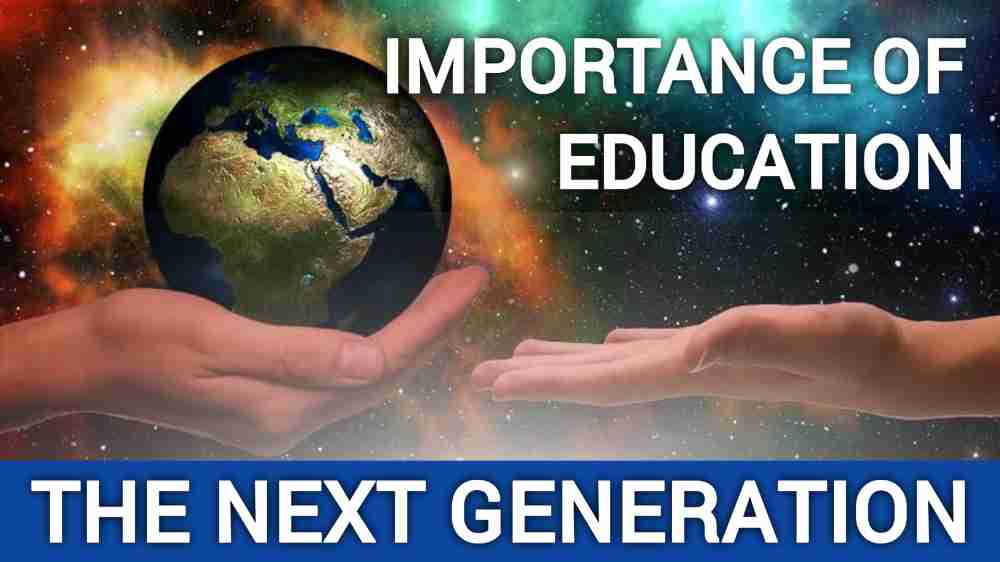Introduction:
In an ever-changing world where technological advancements, Empowering the Next Generation The Importance of Education global challenges, and socio-economic shifts are reshaping societies, the role of education becomes increasingly vital. This article explores the significance of education in empowering the next generation, equipping them with the knowledge, skills, and mindset necessary to thrive in a rapidly evolving landscape.
Nurturing Critical Thinking and Problem-Solving Skills:
Education serves as a catalyst for developing critical thinking and problem-solving skills among students. By encouraging them to question, analyze, and evaluate information, education cultivates independent thought and equips individuals with the ability to tackle complex challenges effectively. In a changing world, where innovation and adaptability are paramount, these skills become indispensable.
Fostering Creativity and Innovation:
Education provides a platform for nurturing creativity and fostering innovation. By encouraging exploration, experimentation, and out-of-the-box thinking, education empowers students to become creative problem-solvers and catalysts for change. In a rapidly evolving world, where novel solutions are needed, education plays a crucial role in preparing the next generation to embrace innovation and drive progress.
Developing Social and Emotional Intelligence:
Education goes beyond academic knowledge and also focuses on the holistic development of individuals, including their social and emotional intelligence. In an interconnected world, where collaboration, empathy, and understanding are essential, education instills these qualities in students. By promoting teamwork, empathy, and conflict resolution, education equips the next generation with the interpersonal skills needed to navigate diverse cultures and build harmonious communities.
Cultivating Digital Literacy and Technological Competence:
In a digital era, where technology permeates every aspect of our lives, education plays a pivotal role in cultivating digital literacy and technological competence. By providing students with the necessary skills to navigate digital platforms, analyze information critically, and leverage technology for productivity and creativity, education ensures that the next generation is well-prepared to embrace the digital landscape and thrive in a tech-driven world.
Promoting Global Awareness and Cultural Understanding:
Education plays a crucial role in promoting global awareness and cultural understanding. By exposing students to diverse perspectives, histories, and cultures, education fosters tolerance, empathy, and appreciation for the richness of human diversity. In a globalized world, where interconnectedness is the norm, education cultivates global citizens who can engage in meaningful dialogue, collaborate across borders, and address global challenges collectively.
Conclusion:
In a changing world, education stands as the cornerstone of progress, empowerment, and transformation. By nurturing critical thinking, fostering creativity, developing social and emotional intelligence, cultivating digital literacy, and promoting global awareness, education equips the next generation with the tools and abilities they need to navigate an ever-evolving landscape. Investing in education is an investment in the future, ensuring that the next generation is prepared to embrace the challenges and opportunities that lie ahead, and contribute to a brighter, more inclusive, and sustainable world.
The Importance of Education in a Changing World :
In a rapidly changing world characterized by technological advancements, economic shifts, and societal transformations, the importance of education cannot be overstated. Education plays a critical role in preparing individuals to navigate and thrive in this dynamic environment. This article explores the significance of education in a changing world, highlighting the key reasons why education is essential for personal growth, societal development, and global progress.
Knowledge and Skills Acquisition:
Education serves as the primary means through which individuals acquire knowledge, skills, and competencies necessary for personal and professional success. It equips individuals with a foundation of subject-specific knowledge, critical thinking abilities, problem-solving skills, and effective communication capabilities. In a world where new information and technologies emerge at an unprecedented pace, education enables individuals to adapt and stay relevant in their chosen fields.
Empowerment and Individual Development:
Education empowers individuals by providing them with opportunities for personal growth, self-discovery, and self-expression. It fosters intellectual curiosity, encourages lifelong learning, and nurtures a sense of purpose and identity. Education equips individuals with the confidence, autonomy, and agency to make informed decisions, pursue their passions, and contribute meaningfully to society. It is a transformative force that unlocks human potential and opens doors to new possibilities.
Also Read : How do I fix low volume on my phone
Social and Economic Mobility:
Education is a powerful tool for promoting social and economic mobility. It breaks the cycle of poverty by providing individuals from disadvantaged backgrounds with access to knowledge, skills, and opportunities that can uplift their lives. Education reduces inequalities by enabling individuals to acquire the necessary qualifications and competencies to secure better job prospects, higher income levels, and improved living standards. It has the potential to create a more equitable and inclusive society by offering equal opportunities for all.
Global Citizenship and Cultural Understanding:
In an interconnected and multicultural world, education plays a crucial role in fostering global citizenship and cultural understanding. It promotes tolerance, empathy, and appreciation for diverse perspectives, values, and traditions. Education encourages individuals to become informed global citizens who are aware of global issues, engage in cross-cultural dialogue, and contribute to building a more peaceful and harmonious world. It enables individuals to embrace diversity, dismantle stereotypes, and work collaboratively across borders to address common challenges.
Adaptability and Resilience:
Education equips individuals with the skills and mindset needed to adapt to change and navigate uncertainties. In a rapidly evolving world, where industries and job requirements undergo constant transformations, individuals with a strong educational foundation are better prepared to embrace new opportunities and reinvent themselves. Education instills resilience, problem-solving abilities, and a growth mindset, enabling individuals to overcome obstacles, innovate, and thrive in the face of change.

